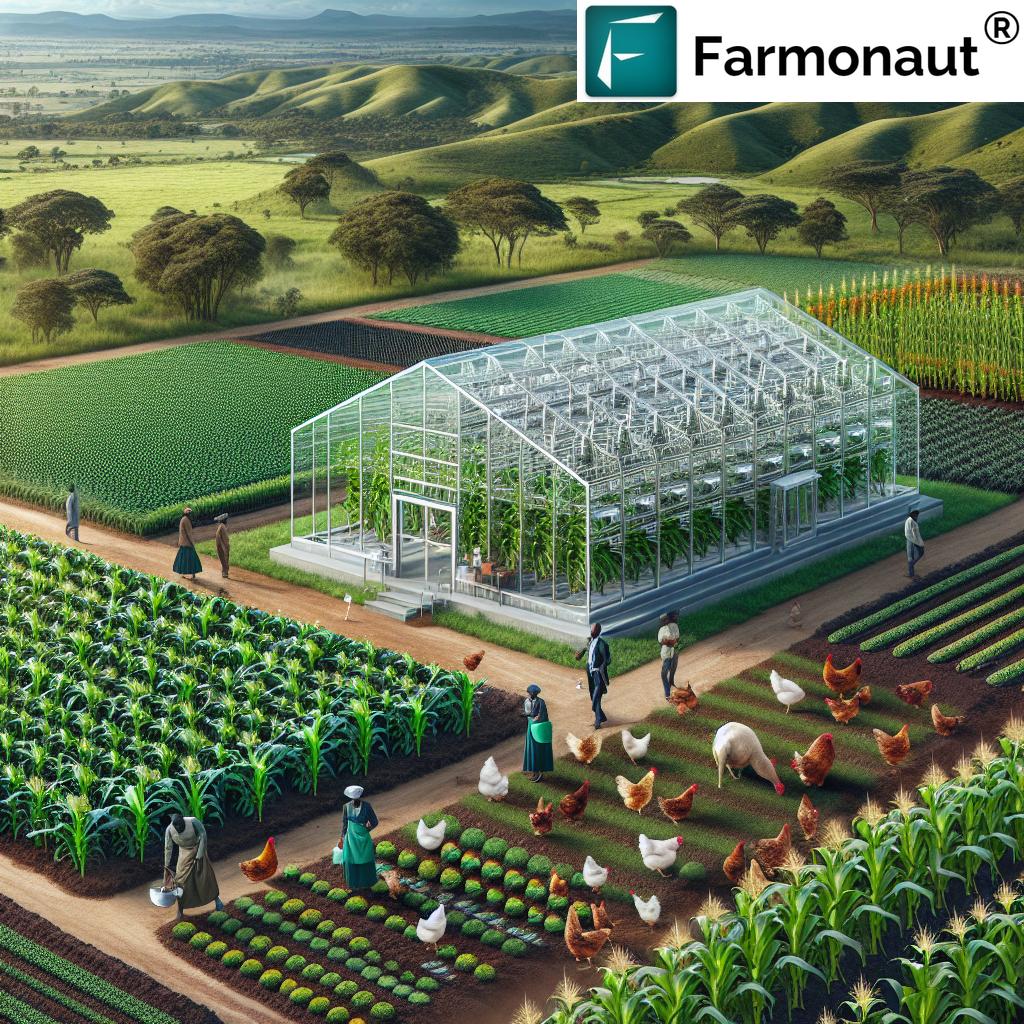Revolutionizing Zimbabwe’s Agriculture: How Maggot Farming Boosts Food Security and Sustainability
In the heart of southeastern Zimbabwe, a quiet revolution is taking place that’s transforming the landscape of sustainable agriculture practices. We’re witnessing the emergence of innovative farming techniques that are not only addressing food security challenges but also paving the way for a more resilient and eco-friendly future. At the forefront of this agricultural metamorphosis is an unlikely hero: the humble maggot.

“Black soldier fly larvae can convert up to 60% of organic waste into protein-rich feed, reducing livestock production costs significantly.”
As we delve into this groundbreaking approach to farming, it’s crucial to understand the context that has made Zimbabwe ripe for such innovation. Faced with recurring droughts, economic challenges, and the ever-present threat of food insecurity, farmers in this southern African nation have been desperately seeking solutions. The introduction of maggot farming, particularly using black soldier fly larvae, has emerged as a beacon of hope, offering a sustainable and cost-effective alternative to traditional farming methods.
The Surprising Journey from Skepticism to Adoption
When the idea of farming maggots was first introduced in Nyangambe, Zimbabwe, it was met with considerable skepticism. Farmers like Mari Choumumba initially recoiled at the thought. In a region grappling with drought and occasional cholera outbreaks, flies were seen as pests and potential disease vectors. However, this perception was about to undergo a dramatic shift.
Thanks to training provided by experts from the United States Agency for International Development (USAID), attitudes began to change. Over the course of a year, what was once viewed with trepidation became a source of opportunity and innovation. Farmers started to recognize maggots not as dirty or disease-spreading creatures, but as valuable resources for creating protein-rich feed for their livestock, particularly chickens.
The Black Soldier Fly: Nature’s Recycling Powerhouse
At the heart of this agricultural revolution is the black soldier fly (Hermetia illucens). These remarkable insects, or more specifically their larvae, have an extraordinary ability to convert organic waste into high-quality protein. This process is not just efficient; it’s a game-changer for sustainable agriculture practices.
- Organic Waste Conversion: Black soldier fly larvae feed voraciously on a wide range of organic materials, including kitchen scraps, agricultural byproducts, and even manure.
- Rapid Growth: These larvae can grow up to 2.5 cm in just a few days, rapidly accumulating protein and fats.
- Nutrient-Rich Output: The resulting larvae are an excellent source of protein, fats, and other nutrients essential for animal feed.
This innovative approach to livestock feed alternatives is addressing multiple challenges simultaneously. It’s turning what was once considered waste into a valuable resource, reducing the environmental impact of organic waste, and providing a cost-effective solution for farmers struggling with high feed prices.
Economic Impact: Transforming Waste into Wealth
The economic benefits of maggot farming in Zimbabwe have been nothing short of transformative. Prior to the introduction of this method, many rural farmers faced significant financial burdens due to the high cost of commercial animal feed. A 50-kilogram bag of feed could cost up to $35, a prohibitive expense for many small-scale farmers.
With the adoption of maggot farming, farmers like Choumumba have reported substantial savings. The cost of producing animal feed has dropped by approximately 40%, a significant reduction that has far-reaching implications for rural livelihoods and food security.
The economic impact extends beyond just feed production. Farmers are now able to raise small livestock like chickens more efficiently, which can generate income more quickly than traditional cattle farming. This shift is particularly important in regions facing climate-related challenges, where adaptability and quick returns on investment are crucial.
Environmental Benefits: A Sustainable Solution
The environmental advantages of maggot farming are equally impressive. In Zimbabwe alone, it’s estimated that 1.6 million tons of waste are generated annually, with 90% of this waste being recyclable or compostable. By introducing maggot farming, a significant portion of this waste can be diverted from landfills and turned into valuable agricultural inputs.
- Reduced Greenhouse Gas Emissions: By recycling organic waste, maggot farming helps mitigate the release of methane and other greenhouse gases associated with decomposing food waste in landfills.
- Water Conservation: Compared to traditional livestock feed production, maggot farming requires significantly less water, a crucial factor in drought-prone regions.
- Soil Health: The residue from maggot farming can be used as an organic fertilizer, improving soil health and reducing the need for chemical fertilizers.
“Maggot farming in Zimbabwe can potentially reduce greenhouse gas emissions by up to 30% compared to traditional waste management methods.”
From Local Innovation to Continental Impact
The success of maggot farming in Zimbabwe is part of a broader trend across Africa. Similar projects have taken root in other nations, each adapting the concept to address local challenges:
- Uganda: Maggot farming is helping to manage fertilizer shortages, providing an organic alternative to chemical fertilizers.
- Nigeria: The country has made significant strides in commercializing maggot production, scaling up operations to meet growing demand.
- Kenya: Innovative projects are integrating maggot farming into broader agricultural systems, enhancing overall farm productivity.
These initiatives are responding to pressing challenges across the continent, including climate change, economic strains exacerbated by global events like the conflict in Ukraine, and increasing food insecurity. The adaptability and low-tech nature of maggot farming make it an attractive option for regions facing resource constraints.

Overcoming Stigma: Changing Perceptions
Despite the clear benefits, maggot farming still faces challenges in terms of social acceptance. In many communities, there’s a lingering stigma associated with insects and waste. However, the tide is turning. In Zimbabwe, acceptance of maggot farming among farmers has increased from a mere 5% to around 50% in just a few years.
Farmers like Choumumba are at the forefront of this change. She now proudly harvests significant quantities of maggots, producing feed that she sells to fellow villagers at lower prices compared to conventional options. Her success story is a powerful testament to the potential of this innovative approach.
The Role of Technology in Sustainable Agriculture
While maggot farming represents a low-tech solution to complex agricultural challenges, it’s important to recognize the role that advanced technology plays in supporting and enhancing sustainable farming practices. Companies like Farmonaut are at the forefront of this technological revolution in agriculture.
Farmonaut offers cutting-edge satellite-based farm management solutions that complement innovative farming techniques like maggot farming. Through their advanced platform, farmers can access real-time crop health monitoring, AI-based advisory systems, and resource management tools. These technologies help farmers make informed decisions about crop management, irrigation, and resource allocation, further enhancing the sustainability and efficiency of their operations.
To explore how Farmonaut’s solutions can support your farming operations, visit their web application or check out their mobile apps:
Comparative Analysis: Traditional vs. Maggot Farming
To fully appreciate the impact of maggot farming in Zimbabwe, it’s helpful to compare it with traditional farming methods. The following table provides a comprehensive overview of key factors:
| Aspect | Traditional Farming | Maggot Farming |
|---|---|---|
| Initial Setup Costs (USD) | 1,000 – 5,000 | 500 – 2,000 |
| Annual Operating Costs (USD) | 2,000 – 10,000 | 1,000 – 5,000 |
| Protein Yield per Hectare (kg) | 500 – 1,000 | 2,000 – 5,000 |
| Water Usage (L/kg protein) | 5,000 – 20,000 | 1,000 – 5,000 |
| GHG Emissions (CO2 eq/kg protein) | 10 – 50 | 2 – 10 |
| Waste Recycling Potential | Low | High |
| Drought Resilience | Low | High |
| Impact on Soil Health | Negative to Neutral | Positive |
| Economic Benefits for Rural Farmers | Medium | High |
This comparison clearly illustrates the advantages of maggot farming in terms of cost-effectiveness, resource efficiency, and environmental impact. It’s important to note that while traditional farming methods still play a crucial role in Zimbabwe’s agricultural landscape, the integration of innovative techniques like maggot farming can significantly enhance overall sustainability and productivity.
The Future of Sustainable Agriculture in Zimbabwe
As we look to the future, the potential for maggot farming and other innovative agricultural practices in Zimbabwe is immense. The success of these initiatives demonstrates the power of combining traditional knowledge with modern innovations to create sustainable solutions.
- Scaling Up: There’s significant potential to scale up maggot farming operations, creating larger, more efficient production systems.
- Integration with Other Farming Practices: Maggot farming can be integrated with other sustainable farming techniques, such as agroforestry and permaculture, to create holistic agricultural systems.
- Research and Development: Ongoing research into optimizing maggot farming techniques and exploring new applications for insect-based products will further enhance the impact of this practice.
- Policy Support: As the benefits of maggot farming become more evident, there’s potential for increased government support and policy frameworks that encourage its adoption.
Embracing Technology for Enhanced Agricultural Practices
While maggot farming represents a return to nature-based solutions, the integration of advanced technology can significantly enhance its effectiveness and scalability. Farmonaut’s satellite-based farm management solutions offer powerful tools that can complement these innovative farming practices:
- Precision Monitoring: Satellite imagery allows farmers to monitor crop health and soil conditions across large areas, helping them make informed decisions about resource allocation.
- AI-Powered Insights: Advanced algorithms analyze data to provide personalized recommendations, optimizing farm management practices.
- Resource Management: Tools for efficient water and fertilizer use can help maximize the benefits of organic inputs produced through maggot farming.
For developers interested in integrating these advanced agricultural technologies into their own systems, Farmonaut offers comprehensive API solutions. Learn more about their API offerings and access detailed API documentation.
Conclusion: A Model for Sustainable Development
The story of maggot farming in Zimbabwe is more than just an agricultural success; it’s a powerful example of how innovative thinking and adaptive practices can address complex challenges. By turning what was once seen as waste into a valuable resource, communities are discovering new avenues for resilience and economic recovery.
This approach to sustainable agriculture not only enhances food security and improves livelihoods but also contributes to broader environmental goals. It’s a model that holds promise not just for Zimbabwe, but for regions around the world grappling with similar challenges of resource scarcity and environmental degradation.
As we continue to face global challenges like climate change and food insecurity, the lessons learned from Zimbabwe’s maggot farming revolution offer valuable insights. They remind us that sometimes, the most effective solutions come from reimagining our relationship with nature and finding value in unexpected places.
FAQ: Maggot Farming in Zimbabwe
- Q: Is maggot farming safe for human consumption?
A: Maggot farming primarily produces feed for livestock, not for direct human consumption. The process is safe and hygienic when properly managed. - Q: How does maggot farming impact local ecosystems?
A: When properly managed, maggot farming has a positive impact on local ecosystems by reducing organic waste and providing an alternative to chemical fertilizers. - Q: Can maggot farming be done on a small scale?
A: Yes, maggot farming can be implemented at various scales, from small backyard operations to larger commercial setups. - Q: What types of waste can be used in maggot farming?
A: Maggot farming can utilize a wide range of organic waste, including food scraps, agricultural byproducts, and certain types of manure. - Q: How does climate change affect maggot farming?
A: Maggot farming is relatively resilient to climate change compared to traditional farming methods, as it requires less water and can be done in controlled environments.
Explore Farmonaut’s Agricultural Technology Solutions
As we’ve seen, the future of agriculture lies in combining innovative practices like maggot farming with advanced technological solutions. Farmonaut offers a range of tools and services designed to support farmers in their journey towards more sustainable and efficient agricultural practices.
Whether you’re a small-scale farmer looking to optimize your operations or a large agribusiness seeking comprehensive farm management solutions, Farmonaut has options to suit your needs. Explore their subscription plans below to find the right fit for your agricultural endeavors:
By embracing both nature-based solutions like maggot farming and cutting-edge agricultural technology, we can create a more resilient, sustainable, and productive agricultural sector. Together, these approaches offer a promising path forward for Zimbabwe and beyond, addressing the pressing challenges of food security, economic development, and environmental sustainability.












